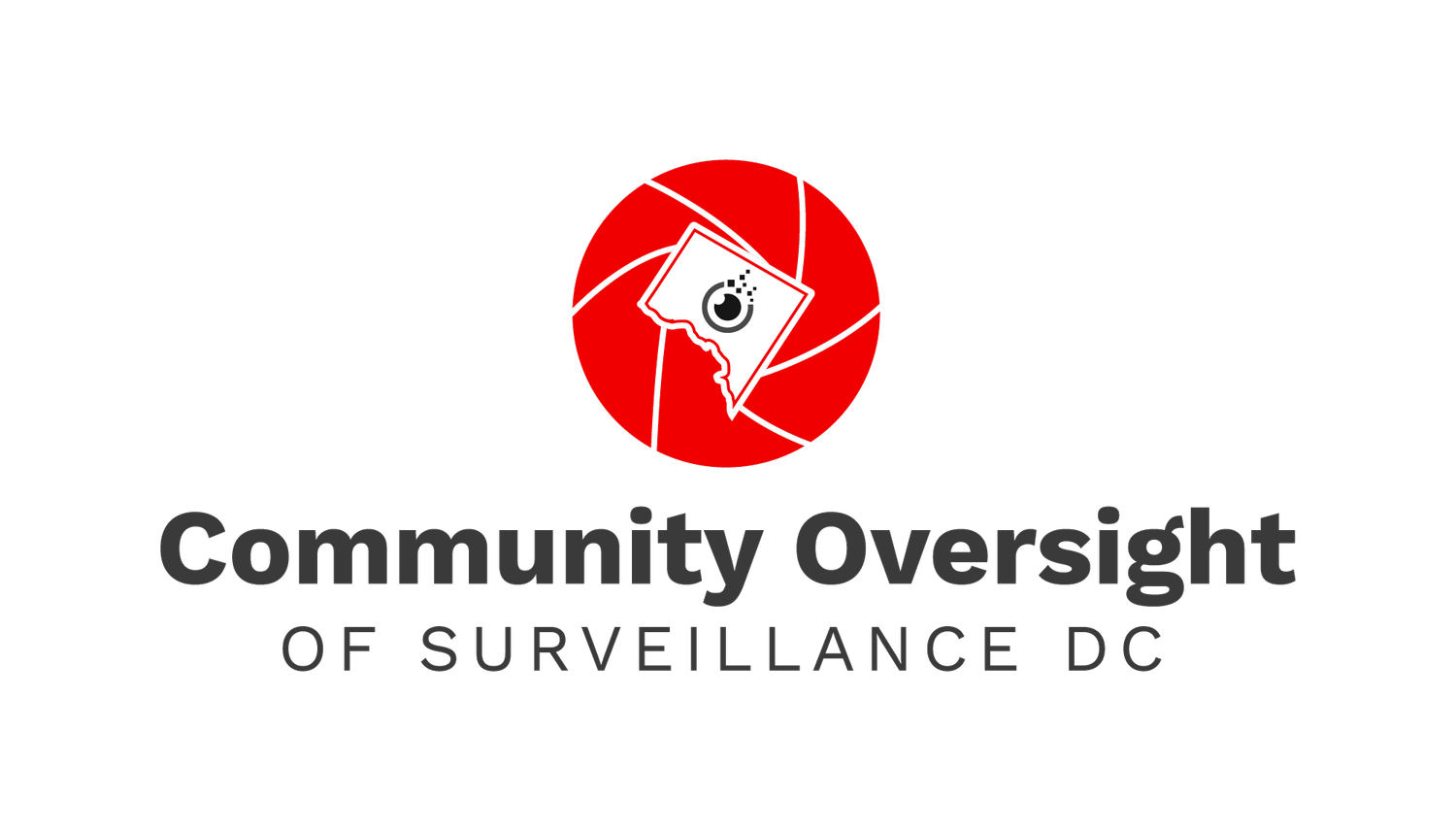
Legislation
Our Legislative Solution
TAKE CONTROL OVER UNCHECKED SURVEILLANCE IN THE DISTRICT
It’s time for us to take control with Community Oversight of Surveillance
Across Washington, D.C., government agencies use sophisticated surveillance technology with no public accountability. This poses a direct threat to the rights and privacy of all District residents and disproportionately harms Black and brown communities, immigrants, low-income communities and communities organizing across the city.
-
For decades the federal government has provided funding for local police to purchase and operate surveillance technologies under the false claim of improving public safety. During this time the police and other local government agencies have been acquiring and using these technologies in our communities without any oversight and in secrecy.
This power has gone unchecked and has become far more invasive as technology advances. Surveillance technologies are frequently acquired and used in secret. Even our local elected officials have little idea what technologies are being used or newly acquired. The public doesn't know what these technologies are capable of, how and when they’re used, what information is gathered about our lives, and who has access to that data.
Communities that are already overpoliced–including Black, Latinx, and other people of color, low-income communities, Muslim communities, immigrant communities, LGBTQ communities, and political activist and organizing groups—face the greatest threats to their civil rights and have not been included in the process about whether or how the government can use surveillance technologies.
-
Black and brown residents have been subjected to disproportionate levels of surveillance as they live their lives and fight for liberation. It is harmful and racist. As the residents push for police reform and abolishment, we can't let police departments shift from racist human policing to racist digital surveillance.
The overuse of surveillance technologies has turned many neighborhoods into fishbowls, and some into virtual prisons, where residents’ public behavior is monitored and scrutinized 24 hours a day.
-
We need to pass legislation that allows the public and the D.C Council to understand the technology's anticipated impact on communities, protect the civil rights and civil liberties of District residents and control how the police, public housing, and other government agencies use surveillance technology.
-
The Community Oversight of Surveillance for Washington, D.C. legislation would create a transparent and public process for considering surveillance technology proposals.
This bill would require that all acquisition and use of such technologies by D.C. agencies be subject to Council approval following a public hearing.
These include surveillance impact reports that explain how a technology works and will impact the community and surveillance use policies that set out specific guidelines for the technology’s use by the agency.
Create a nine-person privacy advisory commission, composed of impacted community members and data & privacy experts, to advise and help inform both D.C. agencies and the Council on civil rights and civil liberties risks of specific surveillance technologies and their use in the District.
Requiring regular assessments and annual evaluations of the District’s use of surveillance technology to ensure that costs–both to residents and to their rights–do not outweigh any potential benefits, and to assess whether D.C.’s use of surveillance technology furthers public safety goals.
-
16 jurisdictions across 8 states have passed local surveillance technology oversight ordinances meant to bring more transparency and democractic control over to their local governments’ use of surveillance technology. As a result, more than 17 million residents, along with countless visitors and undocumented persons, now have a meaningful decisionmaking power say over, and real opportunity to reject, over the use of intrusive surveillance technologies through the democratic process.
-
In 2019 San Francisco's CCOPS legislation included an outright ban on the use of all face recognition technology or any information obtained through such technology.
Technological limitations and biased engineering practices have made facial recognition technology far less accurate in identifying the faces of persons of color. This produces more false positives and increases the likelihood that a person of color will unjustifiably draw the attention of law enforcement.
Its also uncovered action the government officials would like to keep hidden. In June 2020, it was revealed that Seattle Police Department detectives had acquired and possibly used face recognition technology developed by the corporation Clearview AI since at least September 2019. The detectives did so without abiding by any of the Surveillance Ordinance's requirements, in direct violation of the law.
We have even noticed police internally rejecting the use of a surveillance technology because they knew the blowback during a CCOPS review would be overwhelming, such as in Cambridge, where the Cambridge Police Department backed out of a private-public surveillance partnership using the company's Ring surveillance doorbell out of fear of public's response.
Seattle, Washington also requires an annual "Equity Impact Assessment," which addresses whether the ordinance "is effectively meeting the goals of the Race and Social Justice Initiative, including whether any communities and groups in the City are disproportionately impacted by the use of surveillance technologies" and what can be done to improve in the future.
Passing CCOPS legislation does not prevent the District from acquiring surveillance technologies– , but it ensuresdoes make sure that these technologies will that impacted communities have a say in how and when they are used. For example, after passing their CCOPS legislation, at the February 6, 2020 meeting in Oakland, CA, the commission questioned and requested amendments to the Drone Exigent Use Report due to perceived violations of the ordinance. After debates at three different Privacy Advisory Committee meetings, the Oakland City Council approved the Oakland police department drone surveillance policy and use. However, the purchase of drones was limited to those with capabilities allowed in the use policy, and the police department cannot use city funds to purchase any drone devices.
